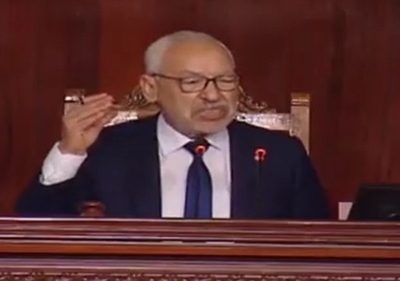Tunisia’s Islamist Parliament Speaker in Hot Water Over Erdogan Meeting
by Hany Ghoraba
Special to IPT News
Investigative Project on Terrorism

Islamists’ second chance at ruling Tunisia is off to a rough start. Newly-elected Tunisian Parliament Speaker Rachid Ghannouchi, who leads the Muslim Brotherhood-linked Ennahda Party, triggered a political backlash this month by secretly meeting with Turkey’s Islamist President Recep Tayyip Erdogan.
The meeting came amid a heated debate in Tunisia over Turkey’s plans to send troops to neighboring Libya to support interim Prime Minister Fayez Al Sarraj, an Islamist affiliated with the Muslim Brotherhood. Al Sarraj’s militias are now besieged in the Libyan capital Tripoli by Libyan National Army forces led by Field Marshall Khalifa Haftar.
In addition to wanting to support an Islamist government, Libya has Africa’s largest proven oil reserves and represents an untapped wealth for Erdogan.
Erdogan visited Tunisia last month seeking support for his planned for military intervention from newly-elected Tunisian President Kais Saied. Erdogan claimed that Saied agreed to support the Tripoli government, which angered a large number of Tunisians who don’t want to side against a neighboring country’s army.
Arabic and Turkish media reported that Tunisia will aid Erdogan’s military intervention in Libya, prompting the Tunisian president’s office rushed to deny taking any side in the Libyan struggle.
The Erdogan controversy comes as Tunisian politicians struggle to come up with a new national cabinet. Prime Minister-designate Habib Jemli was forced out after Parliament rejected his proposed cabinet after months of negotiations. Jemli was a junior agriculture minister and is close to the Tunisian Islamists.
Hours after a no confidence vote forced Jemli out, Ghannouchi was on a plane to Ankara for his secret meeting with Erdogan.
An Ennahda spokesman told Tunisia’s news agency that Ghannouchi spoke with Erdogan in his capacity as party leader, not as Speaker. During questioning in parliament, Ghannouchi claimed he was trying to promote peace in Libya, not war.
But many Parliament members weren’t buying that story.
A majority, 122 of them, voted for an investigation into Ghannouchi’s visit.
Tunisian MP Mongi Rahoui challenged Ghannouchi: “Did you ask Erdogan about the Turkish arms smuggled to Libya through Tunisia? Did you ask him about the ISIS terrorists and what is our connection to that?” This is a serious matter now as you are a member of the national security council.”
“You didn’t travel by a mandate from the president. Then went to meet a president of a country [Turkey] who is a belligerent in the conflict despite the Tunisian official position which is neutral,” Rahoui said.
He called for Tunisia’s National Security Council to investigate Ghannouchi for meeting “a warmongering president and a main element of the struggle.”
“We know very well that the relationship is not a casual one,” Rahoui said. “We know that the headquarters of the Global Muslim Brotherhood is now in Turkey and led by Erdogan and you [Ennahda] are a franchise [and] that play your role.”
“You are a fooling Tunisians and jeopardizing our national security, especially when it concerns your relations to terrorists traveling [into Libya], your relations with ISIS and your secret apparatus?”
Erdogan, Rahoui said in a subsequent Sky News Arabia interview, wants to be able to “use the Tunisian naval borders, airspace, and even soil to send the terrorist groups and militants he used in Syria into Libya.”
Tunisian MP and former presidential nominee Abir Moussa demanded Ghannouchi’s resignation, and a petition launched last week makes a similar demand. Moussa leads the Free Destourian Party, which placed banners inside the parliament hall calling a desired no-confidence vote on Ghannouchi “a patriotic duty.”
Ghannouchi was defiant, saying, “There is no bylaw that governs the roles of the speaker of the parliament. I practiced popular diplomacy and I have notified the Tunisian president in the morning of my visit to Turkey.”
“Our relations with Turkey intensified after the Tunisian revolution,” he said, “because those who rule Turkey believe in our principles of democracy, freedom and free elections.”
Ennahda won control of Tunisia’s parliament after that 2011 Jasmine Revolution, but lost power in 2014. It scored a major victory in parliamentary elections last October, paving the way for to become Parliament speaker.
His position already appears to be at risk with increasing calls for his resignation for endangering national security. If a no-confidence vote occurs, he can be removed by a majority, or 109 votes out of 217 seats in the Parliament. As noted, a greater number want his secret meeting with Erdogan investigated.
Ghannouchi also faces challenges within his own party. Several members have resigned to protest his performance as party leader.
Many Tunisians are now questioning if their 2011 Jasmine Revolution, which ousted President Zine al-Abedin Ben Ali, actually succeeded in improving the country’s conditions. The growing Islamist power, security fears, growing increased Turkish influence in Tunisian politics, dwindling economic and social conditions all feed a growing disgruntlement about the revolution many western observers cite as a leading example for the Middle East to follow.
Hany Ghoraba is an Egyptian writer, political and counter-terrorism analyst at Al Ahram Weekly, author of Egypt’s Arab Spring: The Long and Winding Road to Democracy and a regular contributor to the BBC.

The Investigative Project on Terrorism kindly allows Modern Tokyo Times to publish their articles. This important think tank provides essential information in the area of terrorism.
https://twitter.com/TheIPT Investigative Project on Terrorism twitter account
http://www.investigativeproject.org/ – Investigative Project on Terrorism
https://www.investigativeproject.org/8277/tunisia-islamist-parliament-speaker-in-hot-water